“Now it’s time to update my grandfather’s words by explaining them, and, by doing so, changing our understanding of our place on the planet, who we are, and what goes on inside and between us. It’s about reconnecting our sense of self and soul with our waterways and oceans. It’s about finding our creativity, clarity, and confidence in our deep Blue Minds.” Celine Cousteau, who opens up Wallace J. Nichols’ Blue Mind book, with a fascinating look into the depths of the ocean, reminding us of the words that meant the most to her from her grandfather, the great, Jacques Cousteau, that “The sea, once it casts its spell, holds one in its net of wonder forever. People protect what they love.”
Watch this interview on YouTube here https://youtu.be/wwx1jrHj33c
On today's EPISODE #297 "Blue-Mind: The Surprising Science That Connects Our Brain to Water" we will cover:
✔ What made Dr. Wallace J. Nichols connect the mysteries of the ocean, to our brain.
✔ How he gathered research for this book, and made real world connections between neuroscience and the water, never explored before.
✔ Why we are often more connected, emotional and happier around water.
✔ What Dr. Nichols noticed when he wore a waterproof EEC cap and measured his brain while swimming in the ocean.
✔ How Blue Mind can help us to become more self-aware, and move us towards freedom, possibility, wonder and hope.
✔ Easy ways we can all access and practice Blue Mind, especially on World Blue Mind Day, this Sunday July 23rd.
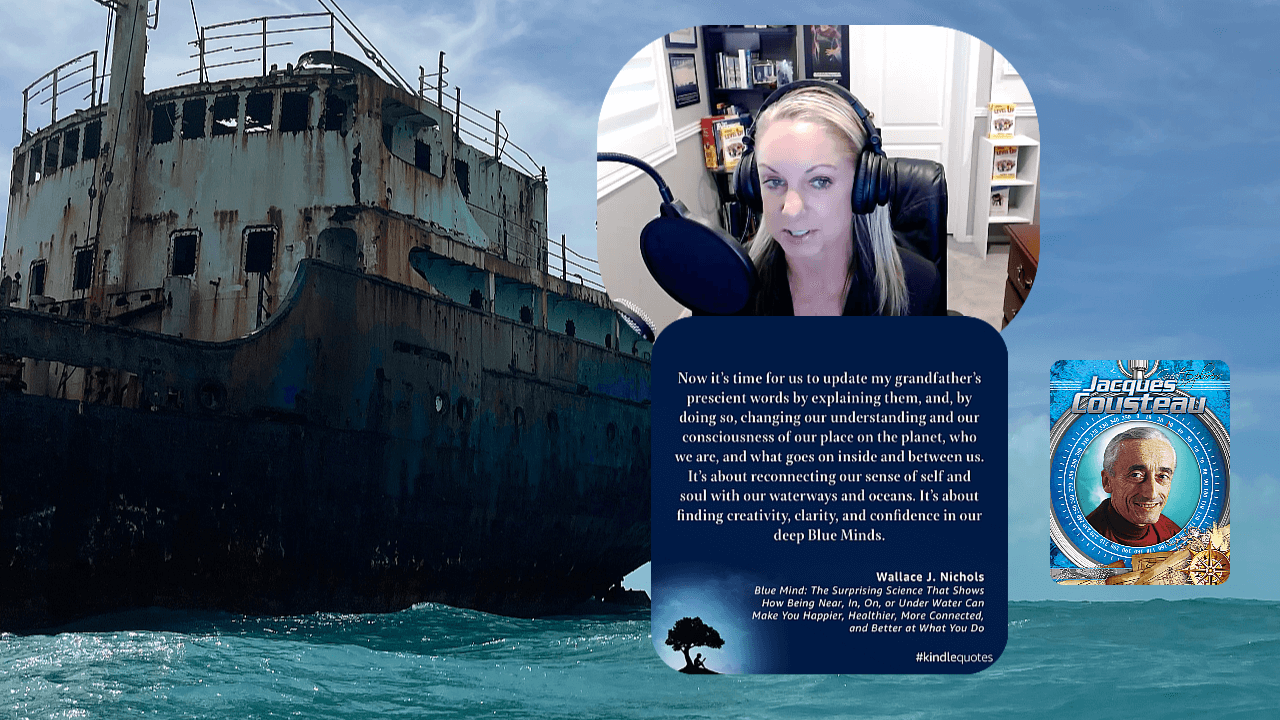
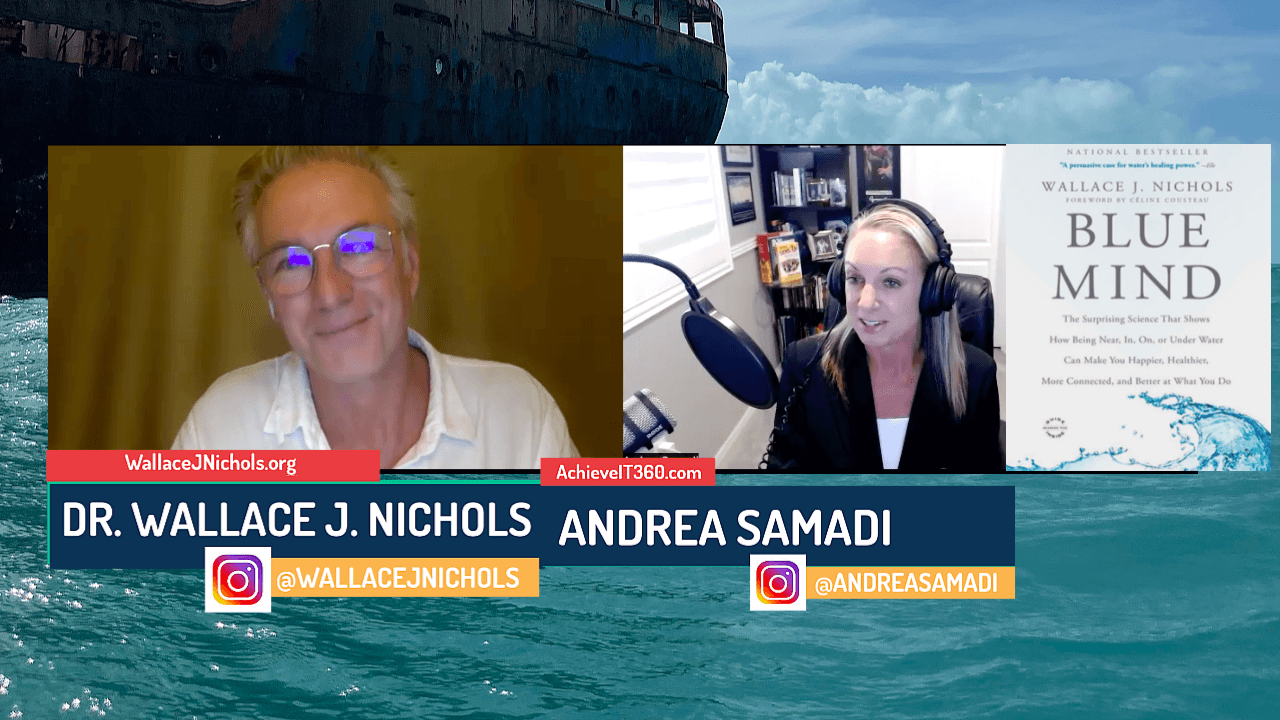
Welcome back to Season 10 of The Neuroscience Meets Social and Emotional
Learning Podcast, where we connect the science-based evidence behind social and emotional learning (that’s finally being taught in our schools today) and emotional intelligence training (used in our modern workplaces) for improved well-being, achievement, productivity and results—using what I saw as the missing link (since we weren’t taught this when we were growing up in school), the application of practical neuroscience. I’m Andrea Samadi, an author, and an educator with a passion for learning and launched this podcast 5 years ago with the goal of bringing ALL the leading experts together (in one place) to uncover the most current research that would back up how the brain learns best, taking us ALL to new, and often unimaginable heights.
For today’s episode #297, we are diving into the depths of the ocean, and learning about some concepts that Dr. Wallace J Nichols[i] has discovered that he calls “Blue Mind: The Surprising Science That Shows How Being Near, In, or Under Water, Can Make You Happier, Healthier, More Connected and Better at What You Do.”
When I was first introduced to Dr. Nichols, I was on a summer vacation with the family and just packing up our trip next to the clearest, bluest water I have ever seen on Grace Bay, in Turks and Caicos. My friend and Performance Coach Luke DePron, from EP 90[ii] sent me an introduction to Dr. Nichols for our podcast, and when I saw his book, I couldn’t have been more excited. I always want to understand the “why” behind certain things, and the ocean (and water in general) is something I’ve always been fascinated with. I took one look at Dr. Nichols’ book, Blue Mind, and I was instantly captivated. He asks some of the questions I’ve always wondered:
- What is water, and Why are we as humans so enthralled by it?
Then I looked at the cover of the book, and the tagline got me thinking more:
- What happens to me when I’m swimming in water?
- Why do I suddenly feel more creative than I do when I’m sitting at my desk? Or more connected to others?
- What happens to me when I dive down to the bottom of the ocean?
Now I’m reading Dr. Nichols’ book, hoping to answer these questions, and also a bit surprised that I never thought of the brain/water connection. If you’ve been following this podcast for some time, you’ll know that I’ve been working on the brain/and learning connection and neuroscience is helping the field of education to make huge strides as we know so much more about how the brain learns best today, than we did 20 years ago. What we are doing essentially, is expanding our level of awareness.
Then I read about awareness from the late author David Foster Wallace, who said in a commencement speech in 2005 that “education should be based on awareness. Awareness of what is so real and essential, so hidden in plain sight all around us, all the time.” (location 175, Blue Mind).
Now my mind is wide open, my level of awareness has expanded, as he says “this is water” and I’m now making the Mind/Brain connection.
This is just the beginning. I’ve got some questions for Dr. Nichols that I hope will expand ALL of our levels of awareness around this thing called water, and how this understanding could possibly make our lives better, by making the brain/water connection.
Let’s meet Dr. Wallace J. Nichols, and dive deep under water together, to see what we can learn from this unique perspective and movement that he’s called Blue Mind.
Welcome Dr. Nichols. I’m sure you could see from my emails to you that this interview was very important to me. Something about being introduced to you when I was standing in front of the bluest water I’ve ever seen! Welcome and thank you for meeting with me today.
Intro Q: After I saw the introduction to you from Luke, I quickly bought your book, and started my journey into Blue Mind, that took me on many twists and turns. I’ve got to begin with the Foreword, because it took me a minute to make the connection between Celine, and the great Jacques Cousteau who I grew up watching on television. What she wrote was profound. Can you talk about what she said about how “the sea, once it casts its spell, holds one in its net of wonder forever” and explain where this journey began for you? What was it the made you even think of connecting the complex mysteries of the brain to the ocean, both being similarly complex?
Q1: While reading your book, I noticed something right from the start and that was the research that you put throughout focused on the leading experts in the field of neuroscience. I noticed each name, because these are the names I’ve been focused on either interviewing on this podcast, or reading their books. Dr. Daniel J Siegel[iii] and his Wheel of Awareness Meditation was one of our early interviews EP #28.[iv] I can list countless others (like Loretta Breuning) or even V.S Ramachandran who mentored Dr. Baland Jalal[v] who were interviewed about the mysteries of the dream world. While you gathered all of the leading experts in the field of neuroscience in your book, like you, I wondered, why is our interaction with water left out of the research?
Q2: “There’s something about water that draws and fascinates us. No wonder: it’s the most omnipresent substance on Earth and, along with air, the primary ingredient for supporting life as we know it.” (Page 8) I related to this as I swam underwater on this vacation, and noticed stronger than usual emotions, feelings and clarity when I touched the ocean floor. Now I’m curious. I never thought of measuring my brain while swimming. Why are many of us fascinated with the ocean?
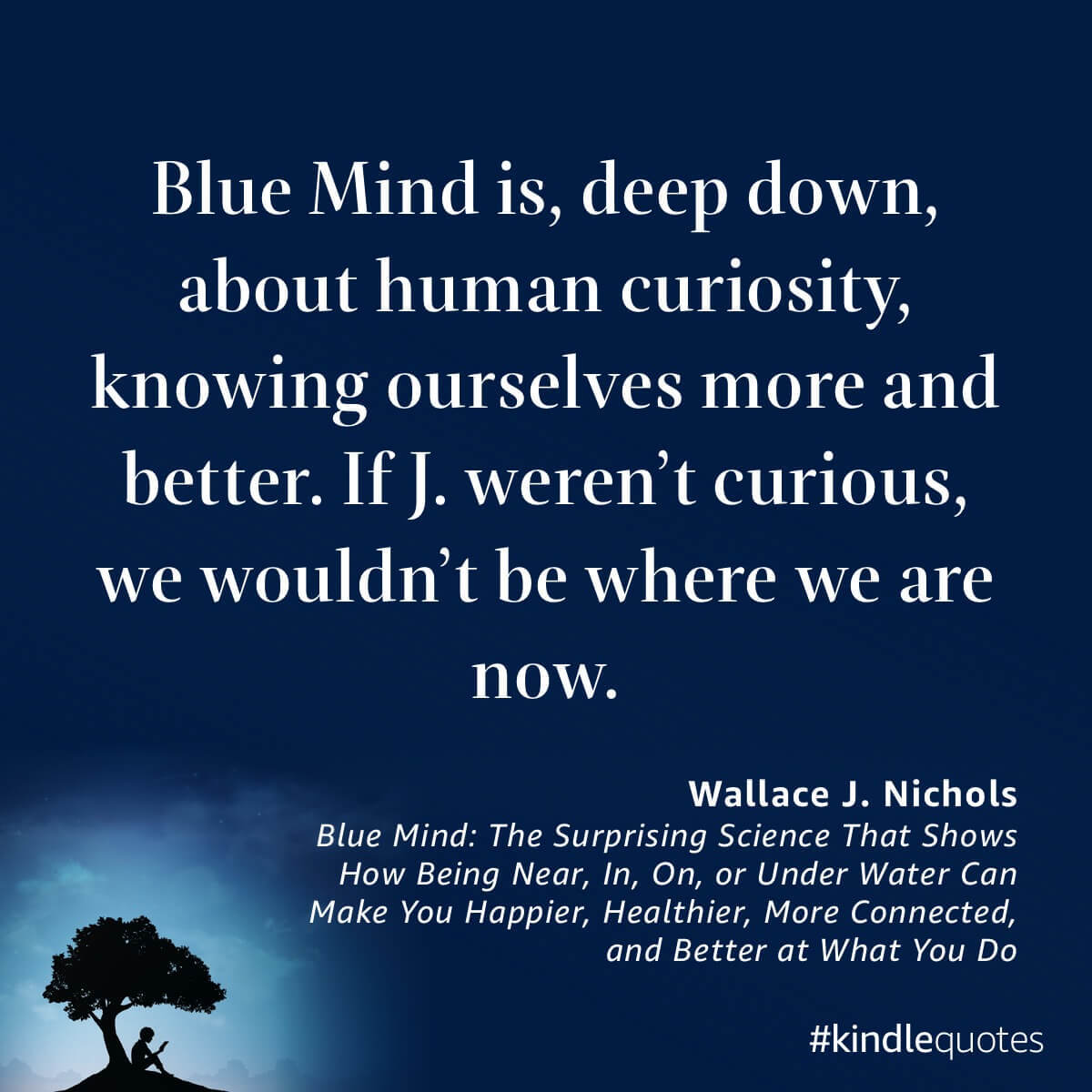
Q2B: Why do some of us feel so emotional around the water?
Q3: What were some things you discovered about your brain with the waterproof EEG cap you used to measure your brain activity while swimming?
Q4: I’ve got to dive into some of your findings a bit here, because I think they are important. I just interviewed a former MLB player, Mike Bordick, and he talked about the meditative nature of fishing that he would do after a busy season of baseball. I never thought about the meditative nature of swimming until you mentioned it in your book. Do you think that swimming could cause our brain waves to go from beta, to alpha (more relaxed) to theta where perhaps the creativity would occur? Is this what you saw when you measured your brain while swimming? We covered a program called The Silva Method[vi] that helps people to go into the alpha level during meditation, for accessing higher levels of creativity. Is this what’s happening to our brain as we swim? Could the ocean possibly be kicking our brains into the theta brain state?
Q5: We’ve spoken a lot on this podcast about expanding our level of awareness through study and I know that being curious is an important part of learning. You say that “Blue Mind is deep down, about human curiosity, and knowing ourselves better.” How can this idea you’ve discovered, Blue Mind, help us to become more self-aware and advance us forward?
Q6: I noticed you called AZ “landlocked” and as someone who loves the water, I’ve often said the same thing about the state. I left Toronto for AZ, 22 years ago. I’m still here, but notice I’m most creative near the ocean. My writing just comes alive here. You go into this deeply in Ch. 6 but I wonder on the surface level, what have you discovered about the physical effects that a visit to the ocean can have on us? What are some ways we can experience Blue Mind is we aren’t near the ocean?
Q7: Did I ever relate to your book, especially when you wanted to look into the science behind our emotional connection to water and you were told “Keep that fuzzy stuff out of your science, young man. Emotion wasn’t rational. It wasn’t quantifiable. It wasn’t science. “
I remember Dr. Daniel J Siegel, who you mentioned throughout your book was told the same thing with medicine, (to keep his emotions out of treating his patients) and that was what made him quit, because he wasn’t supposed to get emotionally connected to his patients which was so far away from the truth.
I was geared towards science in the field of education any time I leaned towards to spiritual side of a person, being told to stay away from anything that science can’t prove. I’m on a mission to draw out this mind/brain/body connection which is why this podcast is called Neuroscience Meets Social and Emotional Learning.
What are we missing when we ignore the fuzzy stuff?
We covered this question in our discussion:
In Chapter 6, Red Mind, Grey Mind and Blue Mind, you go into the health benefits of water. I’m glad to see that you covered Red Mind and Grey Mind in your book, in addition to just the obvious Blue Mind, especially when anxiety is at an all-time high in our country, and I just wrote a question for another author about how stress halts our creative faculties. Can you address how water can help us to transition from the Red Mind of stress or the Grey Mind of numbed-out depression? Where have you seen the life-saving effects of Blue Mind?
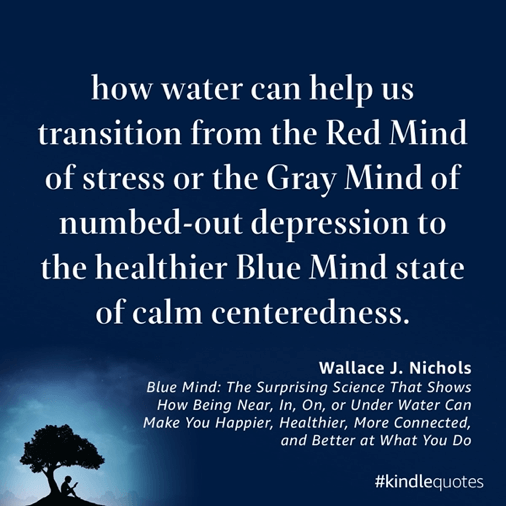
Q8: Van Curaza asked the question “What is your favorite thing about the beach?” on his popular Facebook page. For someone who has spent his career studying the ocean and water, what would be your answer??
Q9: The health benefits we’ve talked about are obvious but what touched me was how many ways water can help those struggling with addiction, of autistic children, or those struggling with PTSD. You mention programs that can help almost anyone who’s struggling in some way, using the water. Or even those young kids you took over the border to Puerto Penasco. I was reading your book on the balcony, overlooking the sea of Cortez just imagining the look on these kids’ faces as they saw the beautiful blue ocean for the first time. What have you seen that’s impacted you the most with water’s healing effects?
Final thoughts. What is your vision with Blue Mind, especially as its World Blue Mind Day coming up this Sunday July 23? I read it while sitting next to the Sea of Cortez over July 4th weekend and it touched me deeply. Not just with how water impacts me personally, giving me answers but the vast research you’ve done, connecting the brain to the healing effects of water for others, and the numerous groups/organizations who are using the idea of Blue Mind to help others.
Dr. Nichols, I want to thank you for your time this morning to share your book and movement, Blue Mind. I don’t think you left a stone unturned with your research and how Blue Mind can help the world.
Blue Mind is now a resource that I’ll add to future episodes, tying in your research that makes a solid case for why being on, near, in or under the water can make us happier, healthier and more connected.
Best of luck for where your vision takes you next.
Final Thoughts and Reflections
If you watch the YouTube version of this interview, you will see a body of water and a shipwreck in the photo. That was taken on our family trip to Turks and Caicos[vii] this past June, of the famous La Famille Express shipwreck that you can visit, and walk through. You can even jump off the back of the ship into the ocean, and in the photo that is throughout the video, I’m covered, but I’m standing on the back of the ship, too afraid to jump. I thought it was fitting to put this image throughout this interview, especially as we spoke about how to use the ocean to increase our level of awareness, happiness and creativity. What am I afraid of? I’ve always had this fear of jumping into water, and who knows where it came from. What’s interesting is that you can see a photo of the crystal clear ocean on the website, showing me now that there would be no rocks or anything that could harm me while jumping into the ocean.
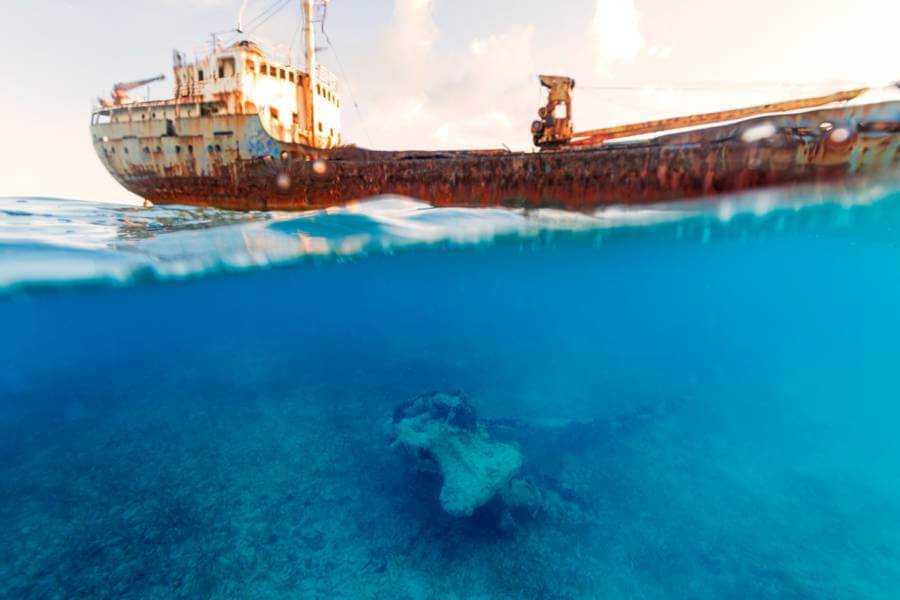
Would this new knowledge make me less afraid? I think it would.
When we can see where we are going, the path becomes clearer, but when we are stressed out, what Dr. Nichols calls Red Mind, we can’t think clearly. I remember standing on the back of the ship, and I’d thrown my shoes into the water so there was no other way I could walk down (through the rusted ship) but I still couldn’t jump in. My RED mind had taken over and there was no ability for me to think or reason.
I wish I had read Blue Mind before this experience. I know this increased awareness would have allowed me to blast through this fear.
So for me, my biggest AHA moment and take-away is that we all increase of our levels of awareness with whatever it is in our life that’s unknown that could be causing us stress, anxiety or worry. Like Dr. Nichols said, if something has got you feeling anxious, just try to find your way to water, and pay attention to how you are feeling. Reflect on what we discussed on this episode and see if you can begin to feel some level of peace, as you practice accessing Blue Mind into your daily life.
If you know someone who might be struggling with something, grab their hand, and take them fishing. Sunday July 23rd is World Blue Mind Day. The most important part to this is to go out and practice Blue Mind and then see if it’s something you can practice, and see where it takes you.
- To increased happiness, creativity, problem solving and thinking?
- Leading us to freedom, possibility, wonder and hope?
I’m in…what about YOU?! I’d love to hear YOUR Blue Mind story, and what you think of this book, when you read it.
I’ll see you next week.
RESOURCES:
7th Annual Blue Mind Award featuring the research of Dr. Justin Feinstein and his research around the benefits of floatation. https://goingcoastal.blue/2023/07/blue-mind-award-2023/
Dr. Justin Feinstein https://www.clinicalfloat.org/Justin-Feinstein-PhD
Howard Fields https://profiles.ucsf.edu/howard.fields
Jeff Clark https://en.wikipedia.org/wiki/Jeff_Clark_(surfer)
Descartes Error: Emotion, Reason and the Human Brain by Antonio Damasio September 27, 2005 https://www.amazon.com/Descartes-Error-Emotion-Reason-Human/dp/014303622X/ref=sr_1_1?hvadid=241600596885&hvdev=c&hvlocphy=9030068&hvnetw=g&hvqmt=e&hvrand=7908659952024351971&hvtargid=kwd-132221002&hydadcr=22534_10353871&keywords=descartes+error&qid=1690063224&sr=8-1
FOLLOW DR. WALLACE J. NICHOLS
Instagram https://www.instagram.com/wallacejnichols/
Twitter https://twitter.com/wallacejnichols
FOLLOW ANDREA SAMADI:
YouTube Channel: https://www.youtube.com/c/AndreaSamadi
Website https://www.achieveit360.com/
LinkedIn: https://www.linkedin.com/in/samadi/
Facebook: https://www.facebook.com/Achieveit360com
Neuroscience Meets SEL Facebook Group https://www.facebook.com/groups/2975814899101697
Twitter: https://twitter.com/andreasamadi
Instagram: https://www.instagram.com/andreasamadi/
REFERENCES:
[i] Dr. Wallace J. Nichols https://www.wallacejnichols.org/
[ii] Neuroscience Meets SEL Podcast EP #90 https://andreasamadi.podbean.com/e/host-of-the-live-great-lifestyle-podcast-luke-depron-on-neuroscience-health-fitness-and-growth/
[iii] Neuroscience Meets SEL Podcast EP #28 https://andreasamadi.podbean.com/e/clinical-professor-of-psychiatry-at-the-ucla-school-of-medicine-dr-daniel-siegel-on-mindsight-the-basis-for-social-and-emotional-intelligence/
[v] Neuroscience Meets SEL Podcast EP #224 https://andreasamadi.podbean.com/e/harvard-neuroscientist-drbaland-jalalexplainssleepparalysislucid-dreaming-andpremonitionsexpandingour-awareness-into-the-mysteries-ofourbrainduring-sl/
[vi] Neuroscience Meets SEL Podcast #261 PART 1 https://andreasamadi.podbean.com/e/a-deep-dive-with-andrea-samadi-into-applying-the-silva-method-for-improved-intuition-creativity-and-focus-part-1/
[vii] Turks and Caicos ShipWreck https://www.visittci.com/other-islands/la-famille-express
No comments yet. Be the first to say something!